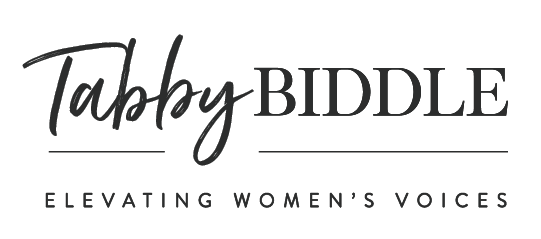U.S. Media Elite Honor Female Pakistani Journalist for Her Courage
by Tabby Biddle
Zubeida Mustafa at the IWMF Courage in Journalism Awards in NYC. Photo credit: IWMF/Stan Honda
Zubeida Mustafa was the first woman to work in Pakistan’s mainstream media. That was more than 30 years ago. Today, because of Zubeida’s courage to use her voice, report on other women’s voices, and argue for hiring policies that would allow women to occupy all positions in the newsroom, life is different for women in Pakistan.
“I wanted to create space for women and I thought if there were more, it would give them strength,” says Zubeida.
Over her three-decade career, Zubeida worked through extreme political instability, media censorship, gender barriers and social upheaval as the assistant editor of Dawn, a widely-respected English-language daily newspaper in Pakistan.
In addition to becoming the first woman in Dawn’s newsroom, Zubeida Mustafa became the first woman on the editorial board, where she fought to gain coverage in the paper for the burgeoning women’s movement. She advocated running stories with women’s voices in all sections instead of relegating them to a “women’s page.”
As Zubeida’s career evolved, the central theme of her work became the inequalities she witnessed in Pakistani society. She wrote on health, education and women’s empowerment. She was able to cover stories that men were not able to because they did not have the same access to women as Zubeida.
When she wrote an article on breast cancer, a group of religious conservatives raided Dawn and accused the paper of printing “obscene” content. Undeterred, Zubeida went on to write about contraception and reproductive health. She also covered the case of rape victim turned women’s advocate when other writers were afraid to mention it.A mother of two daughters, Zubeida not only broke the the social barrier against women working, but of mothers working.
At the IWMF Courage in Journalism Awards in NYC, L to R: Christiane Amanpour, Asmaa al-Ghoul, Zubeida Mustafa, Khadija Ismayilova, Cynthia McFadden and Martha Raddatz. Photo credit: IWMF/Stan Honda
On Monday night in Los Angeles and last week in New York, Zubeida Mustafa was honored by the International Women’s Media Foundation and the U.S. media elite with the Lifetime Achievement Award. What follows is my interview with Zubeida.
Tabby Biddle: I want to talk about Malala Yousufzai, the 14-year-old girl who was recently shot by the Taliban for her outspoken advocacy of a girl’s right to an education. She started her blog at age 11. Is she an anomaly, or are there many girls like her who feel very strongly about having a voice in Pakistan?
Zubeida Mustafa: I think she is an exception. Malala has the support of her family, especially her father, and that really helped her. When she was campaigning, it was her father who accompanied her to many of the places that she went because she was attending seminars and meetings to speak about her experience, her love for education and how others girls should also be educated. I can say that she is rare. That is why we cherish her a lot, we appreciate whatever she did, and admire her because she is inspiring. We are happy that she is on her way to recovery and hopefully we will have more like her in the future.
Tabby: You were the first woman to work in Pakistan’s mainstream media. How did you break through the cultural gender barriers to get to this position?
Zubeida: Initially I had worked for a few years at a think tank before I joined the media. I would say that, for me, the gender barrier had been broken then because it was a major decision then to go and work in a place where there were generally all men around. I had a very good friend at the think tank. She had joined as a research officer, so we were a great support to one another. Then a few years later, I went into the newspaper. So it was not something new for me to enter a man’s world.
Of course initially I had to work hard to establish my credentials because otherwise I wasn’t taken very seriously. You see, women had been working in the media, but they were on the fringes. They were looking after women’s pages — the fashion pages, cookery, and things like that. Writing about serious issues like foreign policy was something new for a woman. I managed to make headway there because once my work was accepted the focus was more on my work than my gender. So the barriers came down.
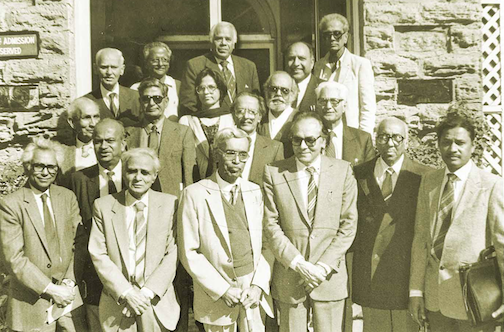
Zubeida Mustafa with Dawn editorial board in the 1970′s. Photo courtesy of IWMF.
Tabby: You pioneered a path for Pakistani women in journalism, beginning in the 70s, by writing about foreign policy, education, health and women’s empowerment. What is the climate like now for women journalists in Pakistan?
Zubeida: There are a lot more women journalists now. It is definitely a different field than when I first started. Television has helped a lot, and also electronic media. People somehow want to have women on television, whether they are anchors, newscasters or producers, but moreso when they are visible. That barrier is definitely not there. But what I would like to see more of is women at the policy-making level in the media. They are there, but we need more of them.
Tabby: When you were writing about issues that hadn’t been touched on before in Pakistan, like family planning, breast cancer, and abortion, were you ever afraid for your life?
Zubeida: No, I wasn’t afraid for my life. I would say things are more difficult in that way for men who are writing about strategic issues, terrorism, and things like that. Many of them have actually been killed because those are very sensitive issues. It was never like that for me. Actually, for me it was more about not doing something very conventional. So it was that which I had to put up with. I think somehow I didn’t care. I just wanted to do what I was doing, and I would go ahead and do it. I didn’t fear for my life. Sometimes when I wrote things, there was a strong reaction, but cultural issues don’t really create the same kind of a threat as political or strategic issues. You can be defamed, but nobody really comes and shoots you for that.It is different these days because we have a bunch of extremists. They are using culture for their own political reasons because they want to control the country. So they bring up all these issues and make them religious or cultural and use them as an excuse to attack education in schools and women who are not adequately covered. This has always been a part of our society that we have a crust of women who are very emancipated, very highly educated, and who’ve been working in some area or another. This is very small, but it has been growing. Even now though it needs to be expanded so that women are brought into the mainstream in all professions.
Tabby: While the numbers of emancipated women are growing, it seems that still the large percentage of the society is gender segregated. First off, am I correct in saying this? And if so, how do you feel this affects Pakistani society from a developmental standpoint?
Zubeida: I think we still have a long way to go as far as women’s issues. Women should be allowed more freedom and more education. But what is happening is that there is greater awareness. I wouldn’t say it’s each and every woman because many women are still steeped in superstition and conservatism, but many of them at least want to do something. Of course they don’t have the means to do it, or the opportunities aren’t there, but at least the will is there. This is most important because I think that is what the women’s movement that started in the 80s did. Now you cannot even conceive of any political party going in for an election and not having some program for women in their manifestos or at least mentioning them. Although they don’t always do what they say, the mere fact that it is expected that they talk about some women’s issues is important.
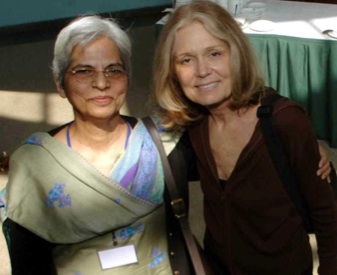
Zubeida Mustafa with Gloria Steinem. Photo courtesy of IWMF.
Tabby: What is it like now in Pakistan in terms of women in leadership positions — in both politics and business?
Zubeida: It has grown, and particularly in politics. Of course I’ll mention Benazir Bhutto who became a role model for women who were in politics and who wanted to be there. There have been some ministers who have been women. Our foreign minister right now is a woman. In the provinces there are number of women in key positions. Even in places where there are very traditional societies, women have come up and are in leadership positions. It is not unusual to find women either at the top or in a very key position. So that is something that is important. I find it more important that once they are there, they open up doors for others, as I did myself. They show the way to others or provide opportunities.
Tabby: It sounds like things are definitely progressing, but there are still over 3 million girls out of school in Pakistan. Why is this?
Zubeida: First, it was wrongly believed that all men do not want to educate their girls. I think there was a time many years ago when men didn’t want to send their girls to school because they just thought that the girls are meant to stay at home and get married, so education was not required. But that was a long time ago. Now most parents want to send their girls to school. But if they are out of school it’s because the facilities are not there. I think the most important factor is that there aren’t enough schools. It’s not just having a big school in a few areas. You have to have many schools close to where the girls are because it’s hard for them to travel long distances. Girls’ security is a major factor. Sometimes the other reason girls are not in school is poverty. Men feel they cannot afford educate all the children, so the boys get entrance. Sometimes where the girls are married off early, the girls might go to school, but just for a few years. But now surveys have shown that the marriage age has gone up in Pakistan. So if the girls are out of school, I think it is partly because of lack of opportunity, partly because of poverty and partly because of culture.
Tabby: I read that the Pakistani government is determined to support girls’ and women’s education. Is that actually true?
Zubeida: I’m afraid that you’d have to ask the Pakistani government, but that is what they claim. I think they could do better.
Tabby: The perception is that Pakistan is very religiously conservative. Is there a progressive component to Pakistan?
Zubeida: One thing I can tell you is that society as a whole outside of Pakistan, and even sometimes within Pakistan, gives the impression through the media that the people generally are very narrow-minded; they are extremists; and they are ultra-religious. I really don’t believe that because I have been to many places where this is not true. Last month I was in Balochistan for a children’s literature festival and generally I found that was not the case. I would say the people are religious. I wouldn’t deny that. They believe that what they believe is between them and their God or their own community, but they would not try to impose that on everyone. Of course they may not be as emancipated and progressive as the small crust of women I talked about earlier, but they are at average and life is not difficult to live that way.
But what has happened is this impression that has been created by extremism. Extremists are armed; they are very vocal; and they create an impact. So obviously the rest of the society is not in a position to contest them because generally people are not armed in Pakistan. It’s only a few people who want to carry arms, so people are at a disadvantage with the extremists. This is what you see today as a result — the extremists are dominating.
Another thing that has come up is that at the universities and higher education institutions, there are some religious parties that are trying to get hold of students and are trying to influence them. Over there you do find some students who give you the impression of being extremely conservative with their religious views. I find that the student parties are off-shoots of the religious parties. They try to organize the students and educate them. This is one reason why I think education is so important, and that it’s important to modernize education and have a better system.
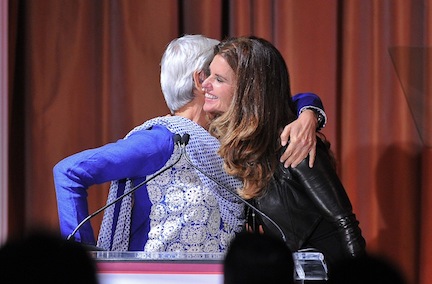
Zubeida Mustafa shares a hug with Maria Shriver at the IWMF Courage Awards in Los Angeles on Monday. Photo credit: IWMF/Vince Bucci
Tabby: How can the international community support women’s empowerment in Pakistan? And do the Pakistani women want that?
Zubeida: That is what I feel disappointed about. Of course I am grateful that the international community has come up in a big way and there is a lot of support for the education of girls and for women’s empowerment. But what is actually happening is that there is a lot of aid going in and it’s just making the country dependent on the donors.What I would want is the aid to be second nature to empowering the people to be self-reliant, to creating opportunities for production and to economic opportunity. If a country increases its production in whatever areas they specialize in, it will be the best way of helping a society—rather than making them aid dependent. I feel many of the schools that have been opened in my country are actually dependent on aid. The agreement is for five years, and we do not know what will happen after that. The donors should see to it that they are making the people self-reliant and independent. Like what the Chinese say, “If a man is hungry, you can provide him fish. But teach him how to fish and he get can the fish himself.” That is what I feel should be done for women’s empowerment.
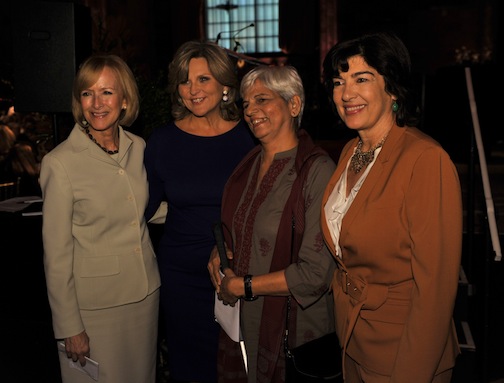
Zubeida Mustafa celebrating with Judy Woodruff, Cynthia McFadden and Christiane Amanpour at the IWMF Courage in Journalism Awards in NYC last week. Photo credit: IWMF/Stan Honda
Tabby: If every girl and young woman in Pakistan could hear your voice, what message would you want to impart to them?
Zubeida: I would tell them please do whatever you can to educate yourself and educate your girls because if people are educated, many of their problems are solved. This is because they have a better understanding of the problem and they have a better understanding of how those problems get resolved. This is what I would tell each and every woman and girl in Pakistan.
The mission of the International Women’s Media Foundation is to strengthen the role of women in the news media worldwide as a means to further freedom of the press. The Courage in Journalism Awards are the only international awards that recognize the bravery of women journalists.
Tabby Biddle, M.S. Ed., is a women’s leadership expert, writer and writing coach specializing in helping women see the value in their voice and develop their leadership platform. Tabby is the author of The Goddess Diaries blog and a regular contributor to The Huffington Post on issues affecting women and girls. Her work has been featured by The Los Angeles Times, USA Today, UN Dispatch, NPR, among other national and international media. To get free resources to increase the power and influence of your voice, visit tabbybiddle.com.
